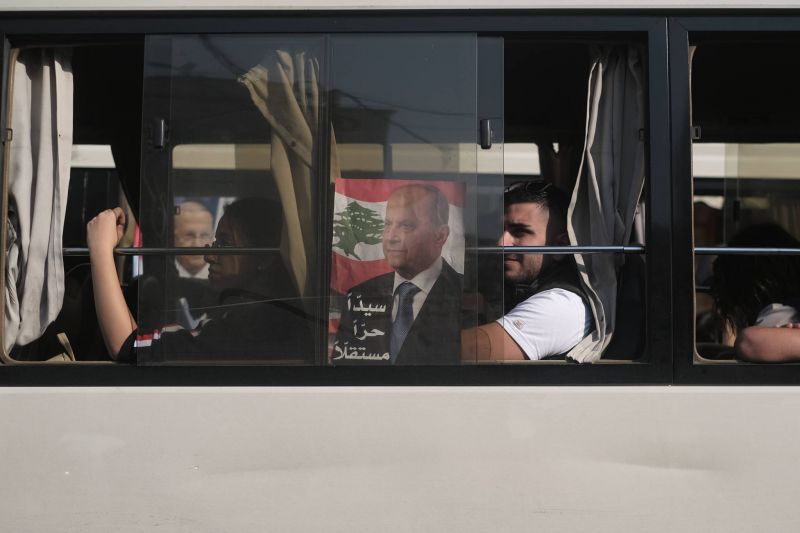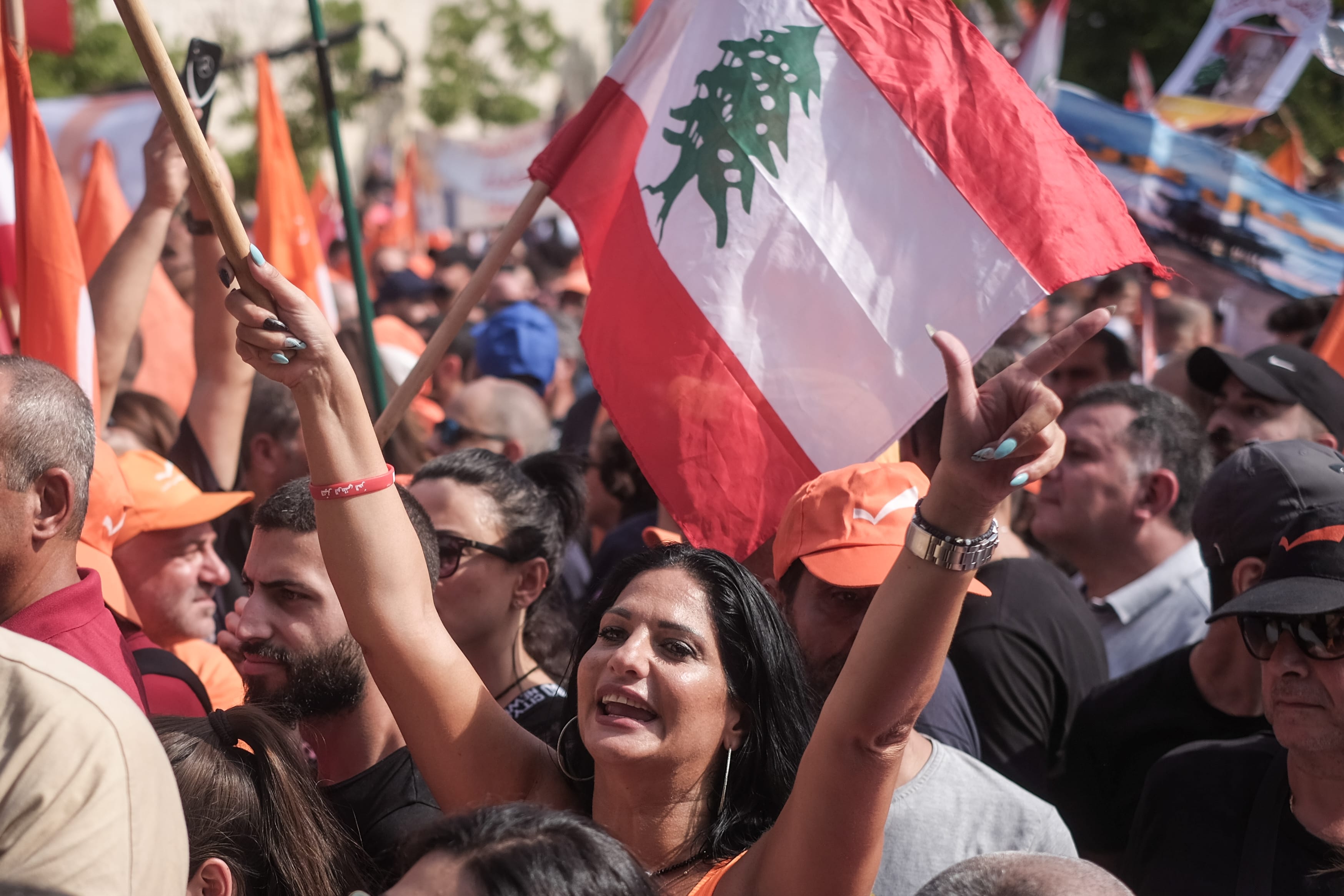
A poster of former President Michel Aoun at a rally marking his departure from office, Oct. 31, 2022. (Credit: João Sousa/L'Orient Today/File photo)
Short on time? Click here to read our overview of Lebanon’s year without a president. Have a bit more time to spare? Keep reading below:
Election timeline
First vote — Sept. 29, 2022: “Everybody knew no president would be elected,” Amal MP Ali Hassan Khalil said after the first of a dozen inconclusive sessions.
The tally: 63 blank ballots, 36 votes for Zgharta MP Michel Moawad, 11 votes for Murex co-founder and L’Orient-Le Jour shareholder Salim Eddé, 10 votes for “Lebanon,” one vote for Mahsa Amini, who died the same month in Iranian morality police custody sparking a wave of protests, and one vote for “the line of [former Prime Minister] Rachid Karami,” who was assassinated in 1987.
LF, the Kataeb, and their independent MP allies voted for Moawad. Forces of Change MPs voted for Eddé. Hezbollah, the Amal Movement, the FPM and their allies voted blank.
Noteworthy events in between:
- IMF official and former Finance Minister Jihad Azour met with Maronite Patriarch Bechara al-Rai, who “suggested his name as one of the main candidates for president,” a senior political figure told L’Orient Today.
Second vote — Oct. 13, 2022: "We are surely heading towards a presidential vacancy," Progressive Socialist Party (PSP) MP Marwan Hamadeh said after Parliament failed to reach the two-thirds quorum.
Third vote — Oct. 20, 2022: 55 blank votes were cast. 42 votes were cast for Michel Mouawad, 17 for "New Lebanon," one for Milad Abou Malhab — an official candidate — and four ballots were disqualified from the vote.
Fourth vote — Oct. 24, 2022: 50 blank votes, 39 votes for Moawad, 10 votes for professor Issam Khalifeh, 13 votes for "new Lebanon," and two canceled ballots.
 A rally marking former President Michel Aoun's departure from office, Oct. 31, 2022. (Credit: João Sousa/L'Orient Today/File photo)
A rally marking former President Michel Aoun's departure from office, Oct. 31, 2022. (Credit: João Sousa/L'Orient Today/File photo)
Noteworthy events in between:
- Aoun left Baabda hailed by a crowd of FPM supporters. His swan speech celebrated the demarcation of maritime borders between Lebanon and Israel, chastised “influential figures” impeding the Aug. 4, 2020 Beirut port blast investigation, accused former Banque du Liban (BDL) governor Riad Salameh of banking crimes and said he attempted to disempower the caretaker government.
- French President Emmanuel Macron, the Arab League, Egyptian President Abdel Fattah al-Sisi and Saudi Foreign Minister Faisal bin Farhan called for the election of a president. Pope Francis called on Lebanese politicians to “put aside their differences.”
Fifth vote — Nov. 10, 2022: 50 blank votes, 44 votes Moawad, six votes for Khalifeh, seven votes for “new Lebanon,” remainder of ballots canceled, one vote for ex-Interior Minister Ziad Baroud, one for Ziad Hayek, former secretary general for the privatization and partnerships council, one vote for “Lebanon” and one for “Plan B.”
Noteworthy events in between:
- Hezbollah leader Hassan Nasrallah said the party wants a President who "will not backstab” them.
- FPM leader Gebran Bassil told journalists in Paris his party will not vote for Marada Movement leader Sleiman Frangieh, rumored to be Hezbollah and Amal’s favorite, “even if everyone agrees” to support him. On Sep. 23, Frangieh told local TV channel MTV: “I am not Hezbollah's candidate, but [the] party trusts me because I do not stab it in the back.”
Sixth vote — Nov. 17, 2022: Marada Movement leader Sleiman Frangieh’s name appeared on a ballot for the first time.
46 blank votes, 43 votes for Moawad, 9 votes for “New Lebanon,” seven votes for Khalifeh, one vote for Frangieh, one vote for Baroud, one vote for MP Michel Daher, and two canceled ballots.
Seventh vote — Nov. 24, 2022: 50 blank votes, 42 votes for Moawad, eight votes for “New Lebanon,” six votes for Khalifeh, one vote for former Customs Director Badri Daher, who was at the time under arrest as part of the investigation into the Aug. 4, 2020 Beirut port blast.
Eighth vote — Dec. 1, 2022: 52 blank votes, 37 votes for Moawad, nine votes for “New Lebanon,” one vote for “For Lebanon,” two votes for Baroud, one vote for official candidate Bechara Abi Younes, one vote for Daher, four canceled ballots, including one for Brazilian president Lula da Silva.
Noteworthy events in between:
- Nine FPM ministers began their boycott of cabinet sessions, considering them unconstitutional amid the presidential vacancy due to cabinet’s caretaker status. Bassil said his party would not vote in concert with Hezbollah and its allies, who attended the government meeting, during the next Presidential election session. Hezbollah said they did not betray any promise to the FPM to boycott meetings.
Ninth vote — Dec. 8, 2022: 39 blank votes, 39 votes for Moawad, nine votes for “New Lebanon,” five votes for Khalifeh, one vote for Baroud, two votes for official candidates Salah Honein and Fawzi Bou Malhab, three votes for Daher, one vote for “Moawad Badri Daher,” one vote for the “agreement” and four more canceled ballots, one of which was for ex-South African leader Nelson Mandela.
Noteworthy events in between:
- Berri proposed to convert the next election session into a “dialogue” to reach a consensus on a candidate. The initiative failed after being rejected by the LF and the FPM.
Tenth vote — Dec. 15, 2022: 37 blank votes, 38 votes for Zgharta MP Michel Moawad, six votes for “New Lebanon,” eight votes for Khalifeh, two votes for Baroud, two votes for Honein, nine votes for “the Pact,” two votes for “the Agreement,” one vote for Bou Malhab, one vote for ex-customs official Chafic Merhi, who was under arrest at the time as part of the port blast investigation, and three canceled ballots, one of which was for US Civil Rights movement leader Martin Luther King Jr.
Noteworthy events in between:
- Bassil met with PSP leader Walid Joumblatt for the first time since 2019. After a meeting with Rai, a Hezbollah delegation called for a “compromise” and said the party does not “veto any candidate.”
- In a speech, Nasrallah urged other parties to not “wait for foreign powers because time is of the essence,” particularly criticizing people waiting for a Saudi-Iranian rapprochement and adding that Iran, the party’s patron, does not meddle in internal affairs.
- LF leader Samir Geagea said his party would block election sessions “initially” if a Hezbollah-endorsed candidate could guarantee 65 votes. Geagea also said that his party and their allies were ready to endorse a new candidate who could outperform Moawad.
Eleventh vote — Jan. 19, 2023: The session coincided with a protest outside Parliament decrying stalling in the port blast investigation — which was halted again after a brief attempt to relaunch it from over a year of paralysis.
37 blank votes, 34 votes for Moawad, 14 votes for “New Lebanon,” seven votes for Khalifeh, seven votes for Bou Malhab, two votes for Baroud, 15 canceled ballots including one for US Senator Bernie Sanders.
After the session ended, Forces of Change MPs Melhem Khalaf and Najat Saliba began a sit-in inside Parliament to protest the “obstructionist policy” in the election and said they would not leave until a president is elected.
Noteworthy events in between:
- In February, the United States, France, Saudi Arabia, Qatar and Egypt (the Group of Five) said they would reconsider ties with Lebanon if the vacancy is further prolonged after a Lebanon-centered meeting in Paris.
- The same month, more than a third of MPs announced they would boycott upcoming legislative sessions. Despite the boycott, Parliament nonetheless passed a law extending municipal councils’ mandates in April shortly before the end of their terms amid difficulties organizing elections. An attempt to appeal the decision by boycotting MPs failed.
- Within days of each other in early March, Berri and Nasrallah announced their support for Frangieh’s candidacy.
- Later in March, Iran and Saudi Arabia said they would resume diplomatic ties — which had been ruptured since 2016. Nasrallah hoped the agreement would help pave the way for electing a president, while affirming that the election is “internal par excellence.”
- In April, Rai brought together Christian MPs for a summit addressing the presidential vacuum.
- During a joint press conference with Forces of Change and independent MPs in early June, Moawad announced his withdrawal and his endorsement of Azour. The LF, the Kataeb, the PSP and the FPM also announced their support for Azour. A week before the vote, Azour suspended his duties at the IMF and a day prior officially announced his candidacy, saying it is “not a challenge to anyone.”
- Around the same time, Macron appointed former French Foreign Minister Jean-Yves Le Drian as France’s special envoy to Lebanon. Days before the vote, an upcoming visit by Le Drian was announced.
Twelfth vote — June 14, 2023: 59 votes for Azour, 51 votes for Frangieh, eight votes for “New Lebanon,” six votes for Baroud, one blank ballot, one vote for Lebanese Army chief Gen. Joseph Aoun and one canceled ballot.
What happened since:
- Le Drian conducted rounds of dialogue with political and religious leaders in Lebanon during three trips to Lebanon — the last of which ended in September. The envoy’s visit and an initiative to propose a profile on a potential candidate had a lukewarm response. The Group of Five met in New York on the sidelines of the United Nations General Assembly to take stock of his visit. After a Doha meeting in July, the five states said they discussed the possibility of penalizing “those who obstruct progress” in the election.
- On Sept. 18, Saliba ended her sit-in inside Parliament to focus on environmental issues. Khalaf said he will continue the protest “until an open session is held with successive rounds.”
- Also in September, Berri, calling for widespread participation in his dialogue initiative, said there would be in early October an “open session with successive rounds until a president is elected — like electing the pope in Rome.” The dialogue initiative failed to gain traction among other political parties. “Let those who rejected it come and propose another solution,” Berri said in late September.
- In October, Frangieh said he and Bassil agreed that “Lebanon is more important than the presidency.”
Short on time? Click here to read our overview of Lebanon’s year without a president.